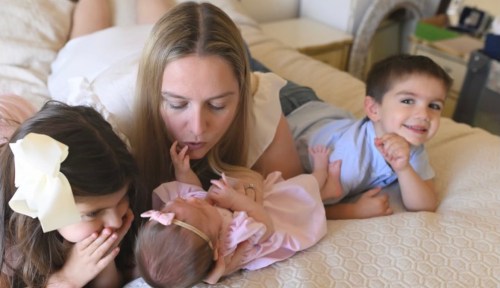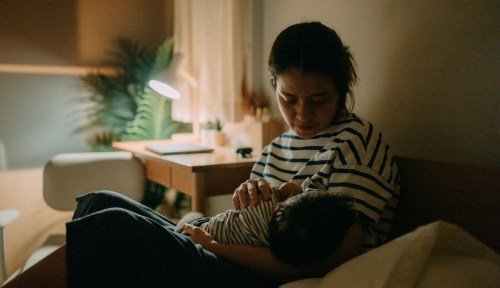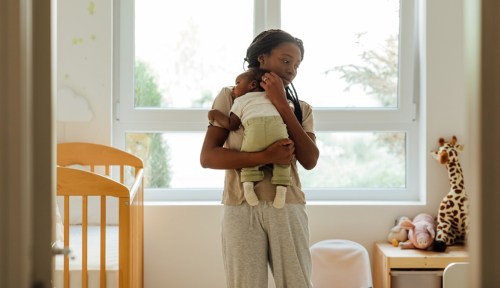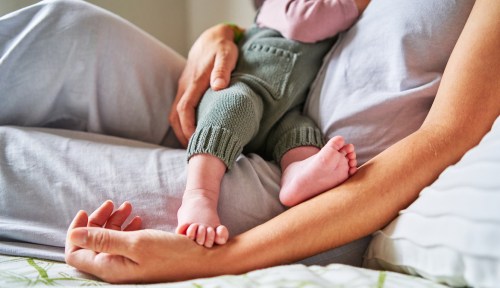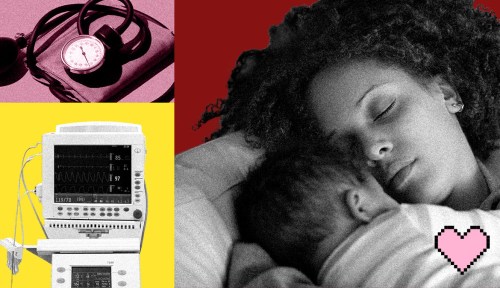The visions started in the first weeks after her son was born. Chelsea Allison, 32, couldn’t stop thinking about her baby getting hurt. Suddenly, danger to her child seemed to be everywhere. Allison couldn’t even look at the stairs without scenes of dropping him playing over and over in her head. The car was another trigger. What if her sleep-deprived haze caused her to crash with her son in the backseat?
Experts in This Article
founder of Motherfigure
Eda Gorbis, PhD is a cognitive therapist, the director of the Westwood Institute for Anxiety Disorders, and an assistant clinical professor at UCLA School of Medicine.
Kristy Christopher-Holloway, EdD is an assistant professor and the founder and director of New Vision Counseling Center. She specializes in working with women experiencing infertility and birth trauma, perinatal mood and anxiety disorders (postpartum depression and anxiety), and pregnancy and infant loss (also commonly referred to as perinatal loss or reproductive loss). She is also certified in perinatal mental health.
Sarah Levine-Miles, LCLW is a licensed clinical social worker specializing in depression, anxiety, postpartum depression, life transitions, identity struggles, relationships, and work/life balance. She is based in Chicago, Illinois.
Then there was the threat of germs, which suddenly seemed to be everywhere. Allison spent a great deal of time cleaning and sanitizing anything the baby would touch. Surely all new moms do this, she thought about her new habits and worries. They just must not talk about it.
But as her fears and fixations progressed in the months after giving birth, Allison realized that something was wrong. “I stopped being able to carry him down the stairs, so eventually, my husband and I just moved everything upstairs so they could be avoided completely,” she says. “I also missed a postpartum appointment because I couldn’t bring myself to drive to the appointment with him in the car.” In fact, Allison stopped driving completely.
She started Googling what she was feeling, but was left with unanswered questions. All she could find was information about the baby blues (something she had talked with her doctor about before giving birth and was prepared to feel but didn’t describe her feelings) or postpartum psychosis, which seemed much more intense than her personal experience.
What Allison was actually experiencing was postpartum obsessive compulsive disorder (postpartum OCD), an anxiety disorder characterized by intrusive thoughts and behaviors that are in response to perceived danger to one’s baby. These thoughts and behaviors are constant and repetitive, and they can become so pronounced that they disrupt daily life, much like traditional OCD. The specific ways it can manifest varies, but can include intense fixation with rituals or cleaning, visions about the baby being hurt or killed, or visions of harming or killing the baby. Even though people with postpartum OCD may have thoughts of harming their baby, they do not actually do so.
Perinatal and postpartum OCD affect 11 percent of new moms, although it’s very likely that the numbers are underreported. But the pandemic might push those numbers upwards. Not only has anxiety in new moms tripled during the pandemic (a risk factor for postpartum OCD), our societal fixation on cleanliness and sanitation might trigger some people’s existing OCD symptoms. And with social distancing measures still in place in many areas, new moms are more isolated than before, making an already lonely experience even lonelier.
Allison’s experience is part of what led her to found Motherfigure, a resource for pregnant and new moms offering support in the vast ways it’s needed, including information about experiences such as postpartum depression or postpartum OCD. This is just one postpartum stigma she is hoping breaks down, through more open conversation about it. Here, experts shed light on what the signs of postpartum OCD are (and how they are often being exacerbated during the pandemic), why it isn’t talked about more, and what treatment looks like.
What causes postpartum OCD?
Psychologist Eda Gorbis, PhD, director of the Westwood Institute for Anxiety Disorders and someone who has studied postpartum OCD, says there are several factors that could lead to the diagnosis. One is a history of anxiety or OCD. Caring for a new baby in a sleep-deprived haze can certainly magnify whatever anxieties or mental stressors someone is already experiencing, or has experienced in the past. This was the case for Allison, who had OCD as a child, but her symptoms had long been dormant.
But even someone who has never experienced OCD could experience postpartum OCD. “If the last trimester of pregnancy was particularly stressful or the [soon-to-be] parents are preoccupied with worry about how they will handle a child, there’s no doubt that the changes and stress can cause these thoughts in both the mother and father after the baby is born,” Dr. Gorbis says. She adds that obsessive-compulsive thoughts can start occurring during pregnancy and if they do, it leads to a greater risk of those thoughts continuing after the baby is born.
Then, of course, there are the drastic hormonal changes that occur during and after childbirth. Studies have shown that low estrogen levels are associated with OCD symptoms, and estrogen levels plummet after giving birth. The fluctuating hormone levels and the stress and anxiety of becoming a new parent could, for some people, be the perfect storm.
“New parents are certainly going to be more fearful about going out into the world with their baby [during the pandemic]. There is also more isolation in general, which is making it more difficult to reach out for help. I think people will be suffering in silence even more and the obsessions are going to get bigger and bigger.” —Sarah Levine-Miles, LCSW
However, parents who do not give birth can also experience postpartum OCD. According to the International OCD Foundation, over two-thirds of healthy new fathers reported unwanted scary negative thoughts about their newborn—showing that the condition isn’t exclusively hormone-based.
Sarah Levine-Miles, LCSW, a clinical social worker, says that there are a few specific things that she asks clients in order to suss out whether they are experiencing postpartum OCD or another kind of postpartum health issue. “I’ll ask questions about what the new mom’s day looks like, how much of it revolves around cleaning, or any changes in behavior,” she says. “I’ll also ask if they’re having any intrusive thoughts or about any ritualizing.” (Allison, for example, says she spent an excessive amount of time sanitizing all her newborn’s baby toys every night.) When clients meet with Levine-Miles in person, she says she can often pick up on if a mom is hyper-vigilant about the safety of her baby, or they may ask questions in roundabout ways about what fears are normal and what’s not.
It’s worth noting that it is common among virtually all new parents to worry about a baby’s safety. When those desires spiral out of control and get in the way of you living your life—that’s when it can become a more disruptive condition like postpartum OCD.
While postpartum OCD during COVID-19 hasn’t explicitly been studied (after all, the virus isn’t even a year old), both Levine-Miles and Dr. Gorbis say they would expect the pandemic to exacerbate the problem. “New parents are certainly going to be more fearful about going out into the world with their baby,” Levine-Miles says. “There is also more isolation in general, which is making it more difficult to reach out for help. I think people will be suffering in silence even more and the obsessions are going to get bigger and bigger.”
Barriers to getting help
“Often, women [with postpartum OCD] are left feeling extreme guilt, shame, and depression, which is extremely detrimental to their well-being,” Levine-Miles says. And this guilt and shame is one of the biggest barriers for people with postpartum OCD to getting help. This was true for Allison; she knew she should seek help, but her intense fear of driving coupled with the stigma she felt about her feelings kept her from reaching out to a professional. (She only received a formal diagnosis retroactively, when she later described what she had experienced to a therapist.)
But both experts say that the intrusive thoughts, which can be disturbing and sometimes violent, stem from a person’s deep desire to protect their child from any harm at all—and aren’t anything to be ashamed of. “Women really beat themselves up about this and often won’t even tell their partner, let alone their pediatrician, gynecologist, or therapist,” Dr. Gorbis says. “[Some] mothers—especially those who are experiencing visions of harming or killing their baby—are scared they are ‘crazy’ and someone will take their baby away from them. So they’re experiencing all of this in secret.”
Kristy Christopher-Holloway, EdD, a certified perinatal mental health counselor, says women of color face these barriers as well as additional ones. “Women of color, especially Black women, have a higher maternal mortality rate than white women. So it’s absolutely more likely for them to feel more anxious going into delivery,” she says. As Dr. Gorbis previously stated, experiencing anxiety during pregnancy or birth increases the risk for postpartum OCD.
“If I had known the signs [of postpartum OCD] and how to seek help sooner, it wouldn’t have taken me so long to work through it. That’s my hope for others; that by talking about it, it not only erases the stigma, but they can get help sooner.” —Chelsea Allison, founder of Motherfigure
Dr. Christopher-Holloway also says that concerns raised by women of color (particularly Black and Latinx women) are often either brushed aside or blown out of proportion thanks to ongoing racism in the medical field. Thus, they may be less likely to bring any concerns they have up with their medical provider, including symptoms of postpartum OCD. “Their concerns can either be dismissed as ‘just the baby blues’ or [exaggerated] to the point where Child Protective Services is called in,” she says.
Even when women speak up about their symptoms, Levin-Miles says they might not be recognized as postpartum OCD by the medical provider or therapist. “I think that OCD in general is something that is not understood well,” she says. “People who have OCD are shown in movies as folks who are focused on doing things a certain number of times or are afraid of germs. However, intrusive thoughts are never really discussed on a larger scale of being a part of OCD.” Dr. Christopher-Holloway agrees, saying this is why she recommends seeking out a peri- or postnatal mental health expert in particular, as they are most knowledgable about maternal mental health issues, including postpartum OCD.
Allison says when she tried to bring up what she was experiencing to a therapist, her therapist started asking questions about if she had fallen down the stairs as a child, completely missing the deeper reason behind her fear of carrying her baby downstairs. “It’s important to find someone who is truly trained to help,” she says.
Now, Allison is pregnant again and is about to give birth during a pandemic—a time when stress and fear is already incredibly high—making her nervous that her postpartum OCD will return. At least this time, she feels less alone.
What treatment looks like
Once women with postpartum OCD are actually aware of its symptoms and able to connect with a trained mental health professional, they can work toward steps to overcome it. The rise in teletherapy during the pandemic thankfully makes it somewhat easier for many people to get help. If a new parent is too scared to leave her home, as Allison was, they can connect with a doctor or therapist virtually, leading to fewer missed appointments and more opportunities to bring up any concerns.
People can also connect with a specialist on sites such as Motherfigure and The International OCD Foundation. But Levine-Miles emphasizes that it’s important parents have a private space at home where they can speak openly without fear of being heard by others so that mom can truly be honest about how she’s feeling.
All three experts say that exposure therapy—aka confronting the source of anxiety directly in a safe setting—is the most common method for managing and overcoming postpartum OCD. Levine-Miles often encourages clients to gradually take steps to overcome their fears. For example, if they’re scared of leaving the house with the baby, they may start with a short trip down the street and then work up to a longer trip later. She explains that it’s just like overcoming any other fear; the more you do it, the less scary it becomes. “You have to be able to habituate the things you’re scared of doing,” Levine-Miles says.
Dr. Christohper-Holloway uses exposure therapy, too. “Often, I’ll also work with a client to help with the anxiety part of postpartum OCD and refer them to an OCD specialist to treat the compulsive behavior,” she says. “There are times when a specific trauma is tied to the obsessive thoughts or compulsions, so therapy can help with that.”
Allison’s hope is that more people will feel comfortable talking about postpartum OCD, which is beneficial both in terms of their own personal treatment and in making other women with similar experiences feel less alone. “If I had known the signs and how to seek help sooner, it wouldn’t have taken me so long to work through it,” Allison says. “That’s my hope for others; that by talking about it, it not only erases the stigma, but they can get help sooner.”
Sign Up for Our Daily Newsletter
Get all the latest in wellness, trends, food, fitness, beauty, and more delivered right to your inbox.
Got it, you've been added to our email list.

